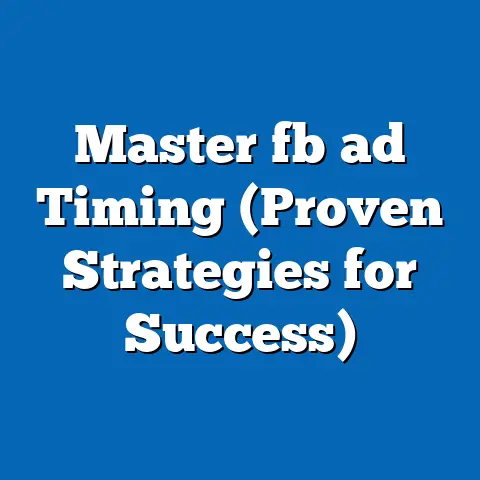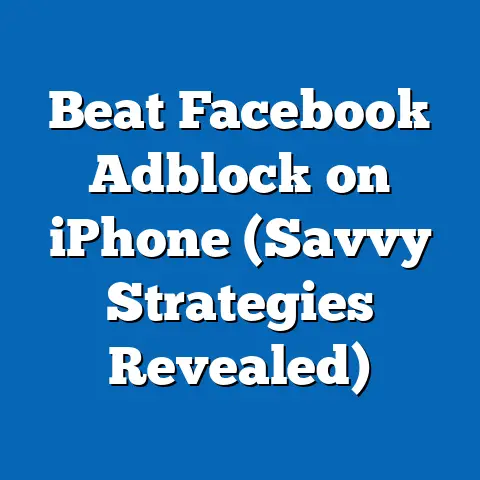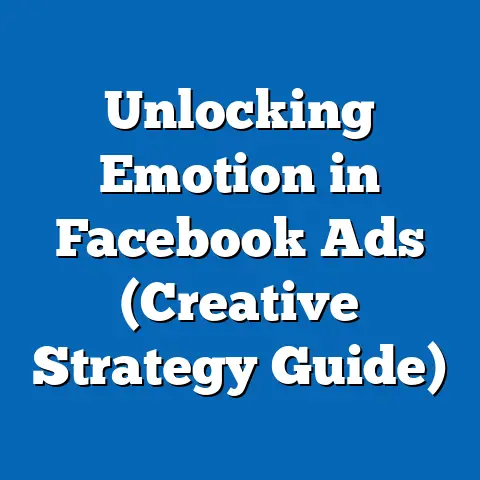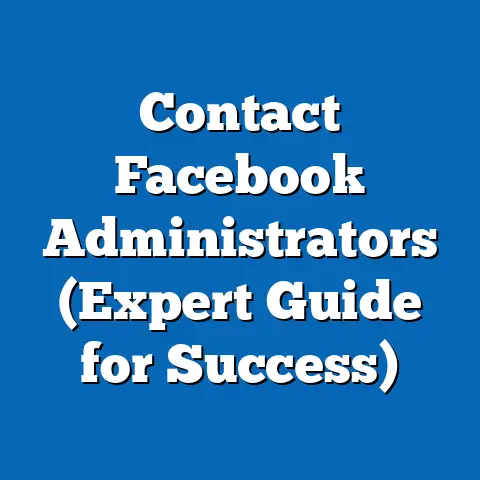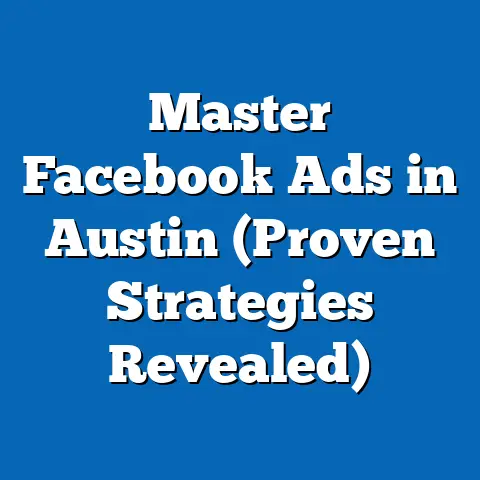Boost Facebook Events for Maximum Impact (Pro Strategies)
Facebook Events.
They’re often overlooked, sometimes underestimated, but undeniably powerful tools for building community, driving engagement, and ultimately, achieving your business goals.
I’ve seen firsthand how a well-executed Facebook Event can transform a fledgling brand into a thriving community hub.
But like any marketing tactic, simply creating an event and hoping for the best isn’t enough.
It requires strategy, planning, and a deep understanding of your audience.
I’ve seen many businesses shy away from using Facebook Events to their full potential, often due to misconceptions about their effectiveness or relevance.
Let’s debunk some of these myths right now.
- Myth 1: Facebook Events are only for large organizations. This is a big one.
I hear it all the time.
The truth is, size doesn’t matter.
Small businesses, individual creators, even solopreneurs can leverage Facebook Events to connect with their audience, promote their offerings, and build a loyal following.
I’ve personally helped local artists host virtual workshops and gain new students through targeted Facebook Event promotions. - Myth 2: Facebook Events are only useful for in-person gatherings. While Facebook Events are fantastic for promoting brick-and-mortar happenings, their versatility extends far beyond that.
Think webinars, online workshops, live Q&A sessions, virtual product launches – the possibilities are endless.
I remember helping a client pivot to virtual events during the pandemic, and Facebook Events became a lifeline for maintaining community engagement. - Myth 3: Simply creating an event guarantees attendance. Oh, if only it were that easy!
Creating the event is just the first step.
Strategic promotion, engaging content, and consistent communication are crucial to driving attendance and making your event a success.
I’ve learned this the hard way, launching events with minimal promotion and being met with crickets.
In this guide, I’m going to take you through the pro strategies I’ve learned over the years, strategies that go beyond the basics and help you maximize the impact of your Facebook Events.
Get ready to dispel those myths and unlock the true potential of this powerful tool.
Understanding Your Audience
Before you even think about creating an event, you need to understand who you’re trying to reach.
Knowing your audience is paramount.
It’s like trying to hit a target in the dark – you’re more likely to miss than to succeed.
You need to understand their demographics, interests, and pain points.
- Identify the demographics and interests of potential attendees: Are you targeting young professionals interested in career development?
Parents looking for family-friendly activities?
Tech enthusiasts eager to learn about the latest gadgets?
The more specific you are, the better you can tailor your event to their needs.
I typically start by brainstorming a profile of my ideal attendee.
What are their hobbies?
What websites do they visit?
What Facebook groups are they a part of? - Use Facebook Insights and other analytical tools to gather data: Facebook Insights is a goldmine of information.
It provides valuable data on your audience’s age, gender, location, interests, and even their online behavior.
I always dive deep into Insights to see what’s resonating with my audience and what’s falling flat.
Google Analytics can also provide valuable insights, especially if you’re driving traffic to your event page from your website. - Tailor the event content to meet the needs and preferences of your audience: Once you have a solid understanding of your audience, you can start crafting event content that speaks directly to them.
This means choosing a topic that’s relevant to their interests, using language that resonates with them, and offering value that they can’t find anywhere else.
I once created a workshop on “Social Media Marketing for Local Businesses” targeting small business owners in my community.
By focusing on their specific needs and challenges, I was able to attract a highly engaged audience.
Takeaway: Don’t skip this step!
Spend the time to understand your audience.
Their interests, demographics, and online behaviors will inform every aspect of your event planning, from the topic you choose to the promotional strategies you employ.
Event Creation Best Practices
Now that you know your audience, it’s time to create an event that grabs their attention and compels them to attend.
- Crafting a compelling event title and description: Your event title and description are your first (and sometimes only) chance to make a good impression.
Make sure they’re clear, concise, and attention-grabbing.
Highlight the key benefits of attending and use strong keywords that will help people find your event in search results.
I like to use a formula like: “[Benefit] + [Target Audience] + [Event Type]”.
For example, “Boost Your Sales: Social Media Workshop for Entrepreneurs.” - Choosing the right date and time: Timing is everything.
Consider your audience’s schedules and habits when choosing a date and time for your event.
Are they more likely to attend something during the week or on the weekend?
Morning, afternoon, or evening?
Use Facebook Insights to see when your audience is most active online.
I also recommend testing different dates and times to see what works best. - Designing eye-catching visuals and promotional materials: A picture is worth a thousand words.
Invest in high-quality visuals that will capture attention and convey the essence of your event.
Use professional-looking graphics, engaging videos, and clear branding.
I often use Canva to create visually appealing event banners and promotional materials.
Takeaway: Your event page is your virtual storefront.
Make sure it’s visually appealing, informative, and easy to navigate.
Pay attention to every detail, from the title and description to the visuals and promotional materials.
Pro Strategies for Promotion
Creating a great event is only half the battle.
You need to promote it effectively to reach your target audience and drive attendance.
Here are some pro strategies I’ve used with great success.
- Leveraging Facebook Ads: Facebook Ads are a powerful tool for targeting specific demographics and interests.
You can create custom audiences based on age, gender, location, interests, behaviors, and even website traffic.
I’ve found that targeting lookalike audiences (people who are similar to your existing customers) can be particularly effective.
Experiment with different ad formats, such as image ads, video ads, and carousel ads, to see what resonates best with your audience. - Utilizing event co-hosts and partnerships: Partnering with other businesses or organizations can significantly extend your reach and attract a new audience to your event.
I’ve collaborated with local influencers, industry experts, and complementary businesses to co-host events.
This not only increases visibility but also adds credibility to your event. - Engaging with local communities and groups: Facebook Groups are a fantastic way to connect with people who share your interests.
Find relevant groups in your community and share your event with them.
Be sure to follow the group’s rules and guidelines and avoid spamming.
I’ve built strong relationships with local group admins and have been able to promote my events effectively within their communities. - Creating a content calendar: Don’t just promote your event once and forget about it.
Create a content calendar leading up to the event to maintain momentum and keep people engaged.
Share behind-the-scenes content, sneak peeks, and valuable information related to the event topic.
I use a tool like Buffer or Hootsuite to schedule my social media posts and ensure consistent communication.
Takeaway: Promotion is key.
Don’t rely solely on organic reach.
Invest in Facebook Ads, partner with other businesses, engage with local communities, and create a content calendar to maximize your event’s visibility.
Engaging Your Audience Pre-Event
The period leading up to your event is crucial for building excitement and anticipation.
Here are some strategies I’ve used to keep my audience engaged and eager to attend.
- Sending reminders and updates: Don’t assume that people will remember to attend your event just because they RSVP’d.
Send reminders and updates through Facebook notifications and Messenger to keep your event top-of-mind.
I typically send a reminder one week before the event, one day before the event, and one hour before the event. - Creating interactive content: Get your audience involved by creating interactive content related to the event topic.
Ask questions, run polls, and encourage people to share their thoughts and ideas.
I’ve used Facebook Live Q&A sessions to answer questions about my events and build excitement. - Encouraging attendees to share: Make it easy for attendees to share your event with their friends and followers.
Provide them with pre-written social media posts and graphics that they can easily share.
I also encourage attendees to tag their friends who might be interested in the event.
Takeaway: Keep the conversation going.
Engage with your audience pre-event to build excitement, answer questions, and encourage them to share the event with their networks.
Maximizing Impact During the Event
The day of the event has arrived!
Now it’s time to deliver on your promises and create a memorable experience for your attendees.
- Utilizing live interactions: If you’re hosting a virtual event, make sure to utilize live interactions to keep the audience engaged.
Use Q&A sessions, polls, and chat features to encourage participation.
I’ve found that calling out attendees by name and acknowledging their contributions can make them feel valued and appreciated. - Encouraging attendees to share: Encourage attendees to share their experiences on social media in real-time.
Create a unique hashtag for your event and encourage people to use it when posting about the event.
I also offer incentives, such as a chance to win a prize, for people who share their experiences on social media. - Creating a sense of community: One of the biggest benefits of Facebook Events is the ability to build a sense of community.
Acknowledge attendees and their contributions, encourage them to connect with each other, and create a welcoming and inclusive environment.
I’ve seen firsthand how a strong sense of community can lead to increased engagement, loyalty, and word-of-mouth marketing.
Takeaway: Make your event interactive, engaging, and memorable.
Encourage participation, foster a sense of community, and make sure your attendees feel valued and appreciated.
Post-Event Engagement and Analysis
The event may be over, but your work isn’t done yet.
Post-event engagement is crucial for maintaining momentum and building long-term relationships with your attendees.
- Following up: Send thank-you messages to all attendees and ask for feedback on the event.
Use their feedback to improve future events.
I also send out a recording of the event (if applicable) and any relevant resources or materials. - Sharing highlights: Share highlights from the event on social media, such as photos, videos, and quotes.
This will remind attendees of the great experience they had and encourage others to attend future events. - Analyzing event performance: Use Facebook Insights to analyze the performance of your event.
Track metrics such as attendance rates, engagement levels, and website traffic.
Use this data to inform your future event planning.
Takeaway: Don’t let the momentum die after the event.
Follow up with attendees, share highlights, and analyze event performance to improve future events and build long-term relationships.
Conclusion
Facebook Events are a powerful tool that can help you build community, drive engagement, and achieve your business goals.
By understanding your audience, creating a compelling event, promoting it effectively, engaging with your audience pre-event, maximizing impact during the event, and following up post-event, you can unlock the true potential of Facebook Events and dispel the myths that may have held you back.
So, go ahead, create your next Facebook Event and put these pro strategies into practice.
You might just be surprised at the results!
I know I have been.
Now, go out there and make some magic happen!

